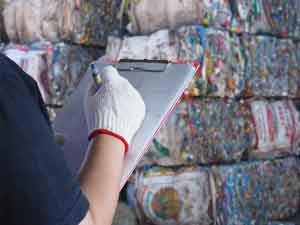The impact of residential wish-cycling in North America is intensifying, causing an economic ripple effect that has resulted in a number of losses.

City recycling programs are under pressure. The last five years has seen 40 percent of recycling redemption centers shut their doors. Escalating costs and dwindling material prices have broken the market. Bad practices are undoing 50 years of progress. If left unaddressed, what will they really cost your city? ‘Better safe than sorry’ has been the wish-cycling mantra in America since the green movement gained ground in the 1970s. From plastic bags to greasy pizza boxes and old bits of electrical cord, city residents would rather try to recycle trash, than risk it ending up in the landfill.
It is an admirable sentiment, but a flawed one that has been allowed to run amok and cause increasing damage to city recycling systems. Recycling contamination rates are so high, municipalities can no longer convert recycling materials into successful revenue streams. Buyers have abandoned a product that has consistently decreased in value.
Many city programs have shut down already, severely restricted material collections, or have had to drastically escalate budgets to stay alive:
• A monthly $25,000 hike in recycling costs has forced the curbside recycling program in Deltona, FL to permanently close.
• In Memphis, TN, the International Airport has shut down its recycling program due to rising contamination levels.

• A 22-year-old recycling program in Broadway, VA was suspended after processing costs climbed by 63 percent.
City recycling programs are in crisis. Municipalities must take immediate action to reduce the practice of wish-cycling among their residents, to preserve the industry.
The Accelerating Financial Burden
Wish-cycling has increased over the years, and now one in four items put in the recycling bin is actually trash. According to Waste Management, in 2014 contamination loads hovered around 16 percent. By 2017 that had risen to 25 percent, enough for us to lose international exports.
The more contaminated the load, the higher the collection and processing costs. Back in 2014, demands were already being made to reduce contamination in single-stream recyclables. No one paid much attention. Non-recyclable materials entered the feedstock, and we watched as recycling programs cost more and more to maintain.
There is a direct correlation between escalating residential wish-cycling and accelerating costs for recycling programs. The only way to ensure that your program remains functional is to step in with modern educational initiatives and tools to improve resident behavior. Despite this need, the industry has remained frustratingly averse to digital solutions.
“There are huge cost savings to be had by reducing residential recycling contamination rates,” says Creighton Hooper, CEO of Recycle Coach, a technology-based recycling education company, “We crunched the numbers, and a municipality with a population size of 25,000 stands to save approximately $27,727.00 per 1 percent reduction in contamination (at a rate of 20 percent) when using the right digital tools. That is a program-saving amount.”
Financially speaking, if wish-cycling continues to escalate as it did between 2014 and 2017, city recycling programs will be forced to close.

The Intensifying Economic Weight
The impact of residential wish-cycling in North America is intensifying, causing an economic ripple effect that has resulted in a number of losses. Consider the loss of trade partners like China, Malaysia and Vietnam, and the reduction of revenue flowing into the recycling industry.
This has caused more than 1,000 recycling plants to close in California alone, with similar shutdowns happening around the country. The recycling industry creates seven to 10 more jobs than the general waste management industry, so industry shutdowns have a significant economic toll.
Losing a workforce of 1.25 million people would be devastating for the U.S. economy, and that is the track the industry is on unless action is taken. According to Recycle Across America, wish-cycling cripples the economics of recycling and is the primary cause of the broken system.

Contamination drives up costs and reduces profitability, which means that manufacturers simply cannot afford to reuse recycled materials. It becomes easier and cheaper to continue to deplete the world’s natural resources.
Even if we put aside the closing plants, job losses and dissolved trade partnerships endangering city recycling programs, we still have a gross inability to meet the demands of a growing sector: sustainability.
Green products and innovations in sustainability are stunted when U.S. companies cannot get hold of high-quality recyclable feedstock. By 2024, this niche will be worth $28.9 billion to the economy, but if there are feedstock shortages, growth will be limited.
A lot rides on the average resident’s ability to correctly recycle materials. If cities do not tackle wish-cycling head on, continued economic losses will be felt for decades.
The Social Consequences
Doing ‘the right thing’ is deeply ingrained in the public consciousness. Yet evidence exists that no awareness campaigns or initiatives have improved the practice of recycling in America for more than 20 years. What municipalities have been doing to inspire change is not working.
The social consequences of wish-cycling are becoming apparent. Expanding landfills and increased incineration means lower property values and more pollution, which enters water supplies, food supplies and the air that people breathe.
Environmental and pollution-related diseases are crippling the population. When the food people eat and the air they breathe make them prone to diseases, the economy suffers. A sickly population means lower quality of life, more poverty and increased early mortality for city inhabitants. Under these circumstances, mental health declines.
As the nation sits in lockdown due to the novel coronavirus pandemic, studies have emerged linking higher death rates to the virus in cities with higher air pollution levels. A Harvard analysis shows that COVID-19 deaths are more prevalent among people exposed to long term fine particulate matter. The kind found in many American cities.
A city that has no real recycling infrastructure will be at the mercy of elevated pollution levels and will be hit harder by whatever crisis comes along—be it a pandemic or a natural disaster.
Steps should be taken to improve the environment people live in so that they are able to withstand the challenges of 21st century life. Residents must be made aware of the role they play in this cycle, and how they are exposing themselves to greater vulnerability in the future if it continues.

The Environmental Costs
Perhaps the most well-known cost for your city is environmental. It connects seamlessly with the other consequences of incorrect recycling behavior and is the most pressing. Before COVID-19 high-jacked the headlines, the climate crisis was the biggest threat that we faced. It still is, with many experts stating that the lessons learned from the novel coronavirus will help America unite against similar threats to global health and security.
No good can come from a system that does not recycle. It takes 450 years for a single plastic bottle to break down. Without recycling, America would have 2.5 million new bottles every hour. Finite resources would be depleted and local wildlife would become extinct as a consequence of lost natural resources.
Trees would be rare. We would see the last of our pygmy rabbits, monk seals and red wolves. Animals that cannot survive in an urban, polluted environment would die out. Every city, town and borough in North America has stories about its local flora and fauna, and they would stop.
Recycling programs are keeping these stories from fading into myth and legend. Wish-cycling is slowly erasing city recycling programs. There is an urgent need for people to create smarter, more sustainable environments. If we allow the death of recycling, we put an end to this dream.

The real cost of wish-cycling for your city is an end to the green movement that we have been fighting for since the 1970s. If it continues, you can expect mounting financial, economic, social and environmental challenges that will worsen with every passing year.
Resident behavior is not just a link in the chain, it is the lock that holds the entire industry together. These are unprecedented times. A few key people have the power to save millions of lives in the coming years. | WA
Recycle Coach is an education company on a mission to end wish-cycling in North America, and to save the recycling programs we need to promote healthier, safer and smarter cities. Their digital tools make it easy for your residents to become better recyclers. For more information, visit www.recyclecoach.com.
References
www.consumerwatchdog.org/sites/default/files/2019-02/Half%20a%20Nickel_0.pdf
www.epa.gov/sites/production/files/2015-09/documents/changng_wste_stream.pdf www.rubicon.com/blog/recycling-contamination-facts/
www.recycleacrossamerica.org/us-recycling-collapse
www.recycleacrossamerica.org/recycling-facts
www.prnewswire.com/news-releases/green-technology-and-sustainability-market-worth-28-9-billion-by-2024–exclusive-report-by-marketsandmarkets-300919510.html
https://time.com/4989641/water-air-pollution-deaths/
www.nytimes.com/2020/04/07/climate/air-pollution-coronavirus-covid.html
www.usnews.com/news/national-news/articles/2019-04-08/100-000-americans-die-from-air-pollution-study-finds
https://glescrap.com/the-effects-of-not-recycling/
https://list25.com/25-u-s-animals-you-wont-find-anywhere-else/3/
www.weforum.org/agenda/2018/11/massive-urban-expansion-threatens-natural-habitats
www.weforum.org/agenda/2020/04/climate-change-coronavirus-linked/
